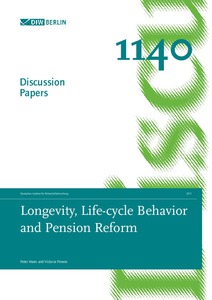Longevity, life-cycle behavior and pension reform

Haan, Peter ; Prowse, Victoria
Deutsches Institut für Wirtschaftsforschung, Berlin
DIW - Berlin
2011
39 p.
life cycle ; life expectancy ; pension reform ; pension scheme ; retirement age
Discussion Papers
1140
Social protection - Old age benefits
English
Bibliogr.
"How can public pension systems be reformed to ensure fiscal stability in the face of increasing life expectancy? To address this pressing open question in public finance, we estimate a life-cycle model in which the optimal employment, retirement and consumption decisions of forward-looking individuals depend, inter alia, on life expectancy and the design of the public pension system. We calculate that, in the case of Germany, the fiscal consequences of the 6.4 year increase in age 65 life expectancy anticipated to occur over the 40 years that separate the 1942 and 1982 birth cohorts can be offset by either an increase of 4.34 years in the full pensionable age or a cut of 37.7% in the per-year value of public pension benefits. Of these two distinct policy approaches to coping with the fiscal consequences of improving longevity, increasing the full pensionable age generates the largest responses in labor supply and retirement behavior. "
Digital
The ETUI is co-funded by the European Union. Views and opinions expressed are however those of the author(s) only and do not necessarily reflect those of the European Union or the ETUI.